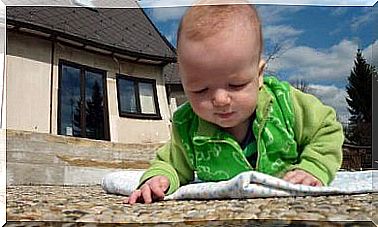Cognitive Development In Adolescence

Adolescence is, as we all know, a stage of profound changes in a person’s life. These not only occur on a physical level, but also on a mental level. Regarding cognitive development in adolescence, significant advances in many aspects can be seen in this phase of life, which we will describe below.
In the first place, we must clarify that cognitive development in adolescence, as well as before childhood, is linked to intellectual, perception and knowledge capacities.
Other areas of development are motor skills, related to movements and physical abilities; and the psychological or emotional, that of feelings.
The stages of cognitive development according to Jean Piaget
According to this reference in psychology, the adolescent has already passed three stages of his cognitive maturation: sensorimotor, preoperational and concrete operations. From the age of 11, meanwhile, he has entered the stage of formal operations.
In it, the following significant changes in the intelligence of the person occur :
- Abstract thinking appears , which allows differentiating ideas or feelings from specific cases.
- This thinking allows you to question your own beliefs and attitudes, as well as changing the way you perceive the world.
- In certain situations, the adolescent may have different interpretations. Before, this was determined by the explanation given to him.
- Abstraction allows you not only to think about the present, but also to project into the future. Know in advance, therefore, the consequences of your actions.

Characteristics of cognitive development in adolescence
This maturation that occurs as a logical consequence of the growth of the young person, produces in him the appearance of thoughts that, in turn, also determine his way of being. Here are some of them:
Imagination and inventiveness
Adolescence is usually a phase of many ideas and great enthusiasm to achieve them. In this stage of life there is a great advance in the imagination. The young man stops thinking about the real to also analyze what is possible, what “could be done”.
Egocentrism
At this age, adolescents begin to form an image of themselves. They worry about their appearance, weight, height, and clothing, among other things. They are bothered, but also overly concerned by, the criticisms of others.
With thoughts, this is also true. They believe that no one understands them, that everything revolves around them and they tend to get angry at the “ignorance” of their parents, who are there to help them.
Questions and discussions
Related to the previous point, cognitive development in adolescence favors the generation of doubts about the foundations of the authorities. This group includes their parents, teachers and guardians.
The boy produces his own judgments about freedom, equality, justice and other values. Then, he no longer absorbs the truths as they are presented to him, but evaluates and compares them with his own ideals.
Also, teens tend to argue frequently. It is important, in these cases, to give them the space they deserve while trying to keep the discussions conceptual and not reach a personal nuance.
Adolescence and socialization
When examining cognitive development in adolescence, it is central to keep in mind that this is a phase of life in which relationships change dramatically. Although the adolescent’s own growth is what marks this process, the environment in which he or she lives also plays a role.
The social circle expands a lot, perhaps too much at this age. Often a teenager appears to have “a million friends,” as a famous song says. This causes you to receive opinions and connect with the thinking of many different people to each other.

That is why there are the questions that we explained before. It is impossible that one of the ideas that comes out of the family niche does not contrast with what he thought. Then, you will begin to realize that the world is very big and the ways of seeing it are many.
This socialization also influences the construction of one’s own identity, which occurs as a result of all of the above. As time goes by, the boy will define his interests and will get closer to those people with whom he shares more activities and values. These bonds of friendship are so intense that they can last a lifetime.
Cognitive development in adolescence is a often turbulent process, which can generate discomfort and emotional imbalance. As a mother, however, you should know that in no way their attitudes reflect a negative feeling towards you.
On the contrary, as the years go by, you will see how your child will value more and more everything you do for him and will thank you for life.











